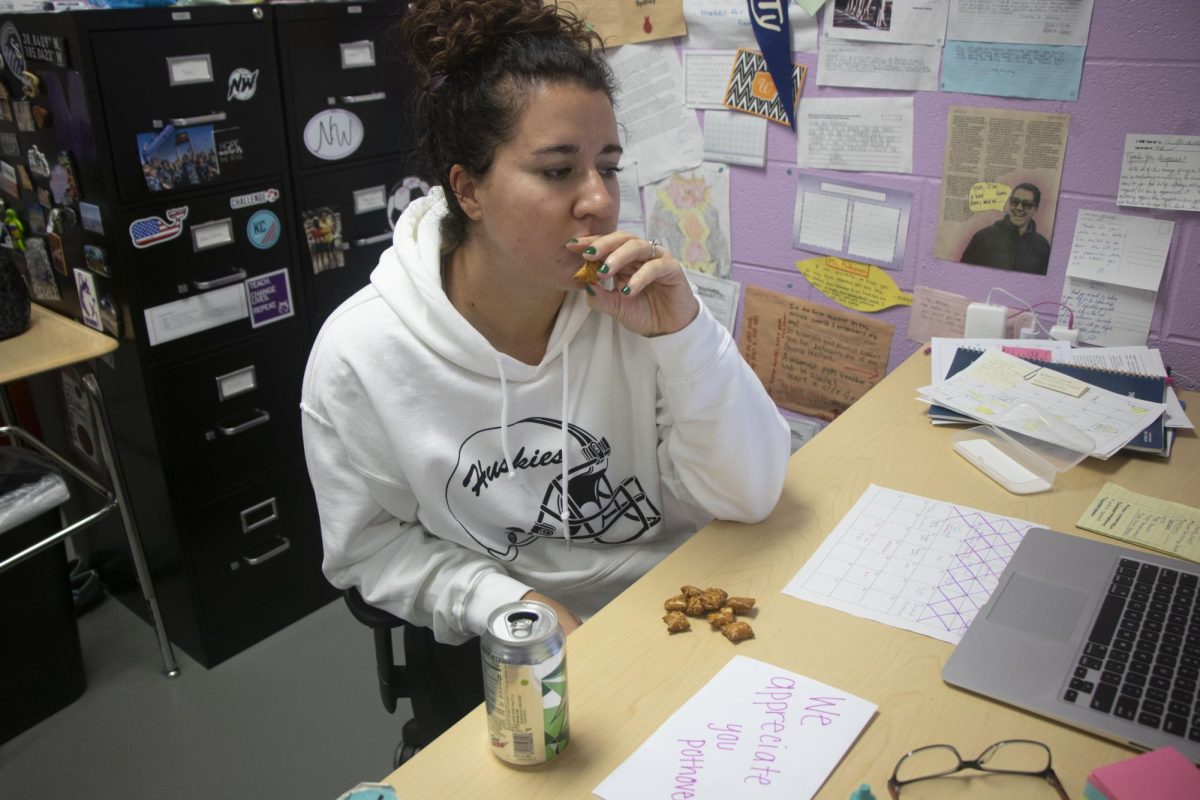For eight weeks straight, junior Carter Hughes said he stuck to a strict diet, which consisted of eating five times his body weight in kilograms of carbs and one gram of protein for each pound.
He said his diet was to keep him feeling good while losing weight in preparation for the upcoming wrestling season. When starting the diet, he said he weighed 168 pounds; however, needed to lose weight in order to wrestle in the 150-pound weight class.
Although Hughes saw positive results after completing his eight-week diet, he said there were negative effects regarding his mental well-being.
“While I was on the diet, physically, my body had never been better. I felt the most athletic, the most mobile [and] the strongest for sure,” Hughes said. “But mentally, I hated the idea of going to meals. I would force myself to eat and that’s not a great relationship to have with food.”
BVNW parent, dietitian and personal trainer, Erin Henry said diets have both psychological and physiological risks involved.
“I think diet culture has set [people] up to have negative body images,” Henry said. “The more restricted you are, the more you ‘fall off the wagon’ where you have this scarcity mindset, that if the diet starts Monday, then the weekends are a binge, and then you do more damage over the weekend.”
Earlier in her career, Henry said she worked in medically supervised weight loss centers where the patient’s only goal was to lose weight. As a result of following a harsh diet, patients did not know how to eat nutritious foods for themselves after the program was complete.
“When I worked at the weight loss center, individuals were on such strict plans they came to have an unhealthy relationship with food and their bodies,” Henry said.
Similarly, PE and health teacher Michelle Pothoven said growing up, she felt pressure to be thinner and often tried to eat less as a result. She said at the age of 32 she finally felt comfortable with her own body.
“When growing up, all I remember hearing [was] that we were supposed to be thinner; particularly women,” Pothoven said. “Unless your body looked a certain way, it was worthless or it was ugly, and the only way to [look good] was to eat less.”
She said she had tried many diets and was on a low-calorie diet where she would try to eat as little as possible for a long time. Pothoven said these diets only sought after the outcome of a perfect body and being skinny which was not sustainable.
“The diets I was on were [focused on] how little can you eat for how long and it was destroying [my] relationship with food,” Pothoven said. “It was not about habits, it was about an outcome unfortunately, and it was about how good you can look and how small you can be.”
Likewise, Henry said many diets are not sustainable. She helps her patients learn how to slowly start replacing unhealthy foods with nutritious foods such as adding more vegetables, fruits and proteins to their diets.
“If someone’s eating a lot of processed foods, I’ll very gradually start to [give] them different recipes that are more nutritious,” Henry said. “You’ve got to learn, ‘how do I incorporate healthy eating practices to where it’s really sustainable?’”
Although some diets are hard to maintain, sophomore Grace Croutch who is currently on a high-protein diet recommended by her doctor said balance is key.
“You can’t restrict yourself too much because then you’ll have no energy at all. Your mental state will be really bad [and] your body will not be in the best condition,” Croutch said. “[However,] if you’re dieting correctly, it can help with thinking, your sleep schedule improves a lot and your overall body functions are going to be better.”
Croutch said she has been overweight a lot of her life. Due to this, she started dieting last year when she got a gym membership. She said she had tried many different diets that were not good for her body, however, the high-protein diet she is on now makes her feel better and more energized.
Pothoven believes diet culture has started to go in the right direction. She said it focuses less on how little someone can eat but instead on what people can do to add healthier foods to their diets.
“I hope diet culture is swinging back to ‘How is food good for you?’ ‘How can you fuel your body properly?’ ‘How can you find a balance?’” Pothoven said.
According to Henry, diet culture refers to the societal norms that put a heavy emphasis on food and exercise in relation to achieving idealized body images.
“Certain body sizes and shapes are often equated with health, beauty, happiness, success or even moral value. Unfortunately, the weight stigma can… promote poor self-esteem, disordered eating patterns and the degradation versus the promotion of healthy behaviors,” Henry said.
To promote healthy eating, Henry said she focuses on teaching her clients to eat more instead of eating less.
“When we are trying to cram our diet and eating habits with good food, we inadvertently have less room for the junk,” Henry said.
Furthermore, Hughes said there are benefits and challenges to many types of diets.
“I think that taking control of your health is good to a certain degree. If you’re telling yourself that you’re going to only eat healthy for all three meals of the day all the time [then] you’re just lying to yourself, you end up not being able to do it anymore,” Hughes said.
In order to maintain a healthy and balanced diet, Hughes said he currently follows the 80/20 rule, where 80 percent of the time he eats nutritious foods, and 20 percent of the time he has more freedom to decide what he eats.
“Whether that be a doughnut for breakfast, having a coffee with something, just making sure to treat yourself while also fueling your body correctly,” Hughes said. “[On the other hand], I also think that those who don’t diet and only eat badly all the time aren’t going to feel very good in the long run… so there has to be a balance.”
Pothoven also said balance is important. She said she hopes teenagers are aware of what they are putting in their bodies.
“If you have a food that you love, you should eat that from time to time, not all the time, we want balance,” Pothoven said.
Additionally, Pothoven said depending on who people follow on social media there can be a lot of body positivity and accounts focused on healthy dieting.
On the other hand, Croutch said how social media has negatively affected diet culture. She said diet culture affects both boys and girls but in different ways.
“Some parts of social media made diet culture way worse because fitness [influencers] want you to look skinny,” Croutch said. “I feel like girls have always had a part of their lives where they want to look like something and they just want to get rid of something. But for boys, it could be that they’re too lean and they just want to gain more muscle.”
Despite diet culture improving, Pothoven said unsustainable diets are still a daily occurrence among all ages.
“Unfortunately, crash diets are going to be around forever because they’re enticing and they promise results that are unsustainable, and that’s why everybody wants quick fixes. So it’s easy to get sucked into all those things,” Pothoven said.
Diet or no diet, Henry emphasized the importance of eating properly to take care of one’s body.
“There are a lot of great ways a teenager can start improving their health, none of which have anything to do with weight loss or food restriction,” Henry said. “Focus on eating more of something that would be good for you rather than restricting the ‘bad’ foods.”






